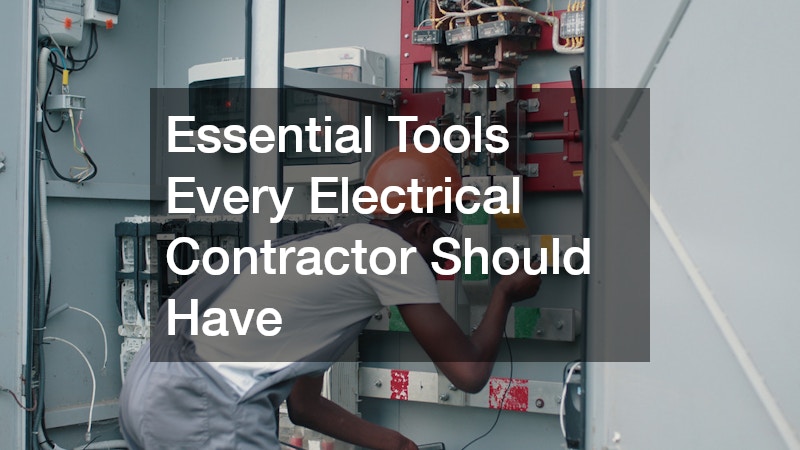
Electrical contractors play a vital role in ensuring electrical systems are installed safely and correctly. Having the right tools is essential for efficiency and safety. This article will explore the must-have tools that every electrical contractor should consider for their work.
Video Source
Hand tools form the backbone of any electrical toolkit. Key essentials include screwdrivers, pliers, wire cutters, and more. Screwdrivers are particularly important as they allow for the secure fastening of various components in electrical installations. Pliers, such as needle-nose and lineman's pliers, help in gripping, twisting, and cutting wires effectively.
Wire cutters are indispensable, particularly when dealing with electrical cables. They allow contractors to neatly trim wires to the appropriate lengths for connections. A robust toolbox also includes combination wrenches, which are versatile tools for securing nuts and bolts in electrical setups. Each tool serves a specific function, ensuring that electrical contractors can tackle various tasks efficiently.
Additionally, electrical tape is an essential item for insulation and securing wires together. This prevents exposure and potential short-circuits in electrical installations. Having a variety of hand tools readily available allows electrical contractors to be prepared for any situation they may face on the job site, underscoring the importance of a well-rounded toolkit.
Testing and diagnostic tools are crucial for troubleshooting and ensuring systems function correctly. A high-quality multimeter is essential for measuring voltage, current, and resistance, allowing contractors to diagnose issues accurately. With a multimeter, contractors can ensure that electrical systems are operating within safe parameters.
Circuit testers are another vital diagnostic tool, enabling contractors to identify live wires and confirm that circuits are correctly wired. They can help prevent accidents by ensuring that a circuit is de-energized before work begins. The importance of these tools cannot be overstated, as they significantly enhance the safety and reliability of electrical installations.
In addition to multimeters and circuit testers, insulation resistance testers are specialized equipment that assess the integrity of electrical insulation. This testing is essential for maintaining safety standards and preventing electrical faults that can lead to critical failures. Equipped with these diagnostic tools, electrical contractors can perform their work with a higher level of confidence and precision, directly impacting the quality of their installations.
Safety should always be a priority. Protective equipment is designed to minimize risk and safeguard electrical contractors on the job. Personal Protective Equipment (PPE) includes safety glasses, gloves, hard hats, and insulated tools. Safety glasses protect contractors’ eyes from debris while working, ensuring clear vision at all times.
Insulated gloves are essential for safeguarding against electrical shock when handling live wires or working in hazardous environments. Wearing appropriate footwear, such as steel-toed boots, provides additional protection against heavy equipment and accidental drops. Altogether, this protective gear serves as a defense mechanism, allowing electricians to focus on their tasks without injury concerns.
A well-prepared contractor will also consider face shields for additional protection against flying particles and sparks during cutting or grinding tasks. Having a full set of protective gear not only promotes safety but also ensures compliance with regulatory standards in the electrical industry. In summary, the right protective equipment is indispensable for electrical contractors to maintain safety while performing their duties effectively.
Power tools can significantly enhance the efficiency and effectiveness of an electrical contractor's work. Tools such as drills and saws allow for precise and less labor-intensive installations of electrical systems. Cordless drills are particularly popular among contractors for their portability and functionality, enabling them to work in various locations without being hindered by cords.
Moreover, saws, including reciprocating and circular saws, make cutting through materials like wood and metal both easier and quicker. These tools help ensure that contractors can create necessary spaces for electrical installations, such as junction boxes and appliance hookups. Investing in quality power tools can greatly enhance a contractor's productivity and reduce the time required for specific tasks.
In addition, power tools often come with advanced features that improve work quality. Features like variable speed settings and guided laser lines assist contractors in achieving a professional finish. The integration of technological advancements into power tools has revolutionized the electrical contracting industry, making them indispensable for modern electrical work. Overall, power tools are a crucial component of an electrical contractor's toolkit, offering practical solutions to everyday challenges in the field.
